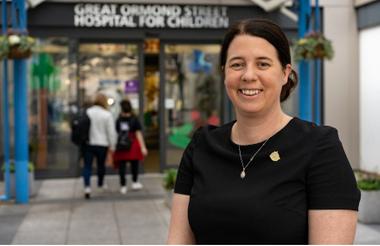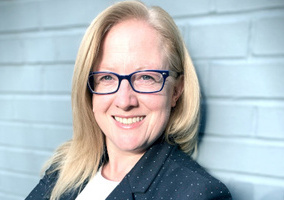Creating a fair and equitable environment in which people from different backgrounds and with different lived experiences can thrive should be at the heart of any organisational recruitment and retention strategy. In the charity sector, it is absolutely the right thing to do, because as charitable organisations, we play an important role in shaping society’s values.
Diversity of thought and different voices and perspectives are also invaluable for a charity seeking to widen its reach, drive positive fundraising results and better reflect the people and communities it exists to support. But despite all of this, it is well known that there is a lack of diversity in fundraising.
So, what practical steps can we all take to create the long overdue change that is required, particularly when it comes to recruiting talented people into fundraising roles?
EDI strategy at GOSH Charity
At Great Ormond Street Hospital Children’s Charity (GOSH Charity), we launched our first-ever equality, diversity and inclusion (EDI) strategy almost a year ago, setting out our commitment, vision and ambition to do more to create an inclusive society and workplace. It is essential that these values are intrinsic to our business practice and our individual behaviours.
This work has been spearheaded by our CEO Louise Parkes, and in our first year we have focused on embedding the strategy across all teams, providing training for all our staff, and setting up an EDI board and employee forum to champion and drive forward our EDI activity. But another really important way we have been able to have an immediate, positive impact, is by reviewing and revising our recruitment processes.
We recently completed an organisational restructure to ensure we had the right resources in place to deliver on our five-year strategy, underpinned by an ambitious fundraising strategy. All of this will enable us to deliver life-changing impact for seriously ill children from across the UK who are cared for at Great Ormond Street Hospital (GOSH).
Recruitment drive
Our restructure was followed by a recruitment drive, and we had a number of exciting roles to recruit for in our newly-formed fundraising directorate. Here are some key steps that we have deployed, none of which are rocket science, but all of which have made a difference:
- We made a commitment to advertise every opportunity externally, as well as internally, and galvanised managers and leaders across the charity behind our shared goal to increase the diversity of our teams.
- We reviewed our advertising strategy and placement with the aim of attracting a broader range of candidates. We also used LinkedIn much more than we have previously. If we aren’t advertising on platforms that have a wide reach, the chances are we will continue to attract a similar pool of candidates for each role we take to market.
- We reviewed the information included in our job descriptions and job adverts to ensure we use inclusive language. When our advert is in front of a potential candidate, it’s important that they know they would be welcomed and valued in our organisation.
- We changed how we collect diversity data for applicants throughout the recruitment process. Without data, you can’t track where you are and that makes it impossible to hold the organisation accountable.
- We adapted our shortlisting process to help remove any potential bias. Simple and small changes, such as marking each application against the essential and desirable criteria, helps hiring managers have an additional level of objectivity when it comes to inviting candidates for interview.
- We introduced more rigorous methods for assessing applications and, as our recruitment drive began, all hiring managers were invited to a briefing session covering unconscious bias, what it means and how to tackle it. This helped reinforce fairness in the selection process.
- When we have needed support from a recruitment agency, we have ensured that their approach to EDI is aligned with ours. This means that for roles where we need more specialist recruitment support, we are still getting the role in front of the widest pool of candidates possible through an agency that mirrors our own commitment to EDI.
- We signed up to the Disability Confident Scheme for employers and we display the Disability Committed badge (Stage 1) on our job adverts.
- We trialled sharing a summary version of the interview questions to candidates at the same time as the interview calendar request, giving the candidates the chance to properly process and prepare for the questions in advance of being asked.
These steps are a start, yet we know that there is more we need to do to achieve our aims in this important area and we won’t rest on our laurels. Attracting a diverse pool of applicants to our roles is extremely important as we want our workforce to truly reflect the communities that we serve. Through our recruitment drive, in 2021 alone we saw an increase in the number of staff from Black, Asian or other minority ethnic backgrounds, growing from 9% to 19% of our staff base across the charity.
We are currently in the process of undertaking a review of our EDI strategy to inform our plan for the coming year. We will also conduct a full analysis of our recruitment once it is complete so we can understand which of the changes to our recruitment practices have been successful. This will also help us identify where we can continue to learn and improve our practices, to attract a wide range of candidates from diverse backgrounds.
Retaining talent
Once we have recruited colleagues, we need to work hard to retain them, which goes hand in hand with building a high-performing fundraising team with diversity of thought at its heart. That’s where the charity’s EDI board (made up of named employees from across different directorates who meet every two months to oversee our EDI strategy and monitor our progress), and our EDI forum (a more informal space open to any colleagues to regularly get together and share ideas and inspiration as well as challenges), can both play an important role. It’s through these spaces that staff have championed small, day-to-day changes that can make a big difference.
For example, we encourage staff to share their pronouns in their email signatures if they feel comfortable to do so and we recently joined the Race Equality Matters campaign, #MyNameIs, which is a simple but effective campaign that helps ensure people’s names are pronounced correctly.
We have also hosted a variety of fantastic, inspirational speakers from a range of different backgrounds, from inclusion expert and activist Rachel Reese, who spoke about the trans and nonbinary space, to diversity consultant Winston Ben Clements, who spoke about championing disability inclusion. Other topics have included inclusivity and menopause in the workplace. Our guest speakers have generously shared different perspectives we might not all be as familiar with, and this helps educate colleagues and, I hope, builds confidence that we offer a safe space where these topics can be openly discussed.
In addition, we have been considering how we can better engage the different communities that come to GOSH. Last year, we created a workstream focused on Islamic giving and dedicated an innovation sprint to exploring the opportunity of working more closely with the Muslim community. As a charity, we want to be considered by people of all faiths, and those of no faith, as a cause that they wish to support. So we need to create an environment that is truly inclusive and gives a sense of belonging to supporters from all backgrounds.
Along with my colleagues, I am committed to ensuring everyone feels able to bring their whole selves to work. We have made good progress, but we are by no means finished.
Liz Tait is director of fundraising at GOSH Charity @liztait
Related articles












